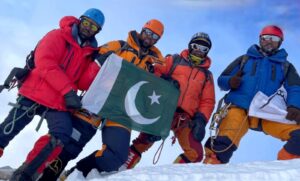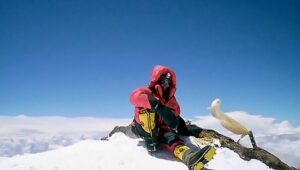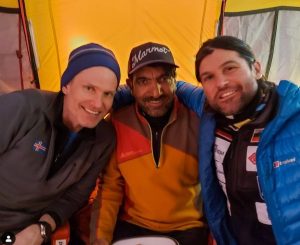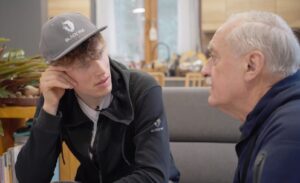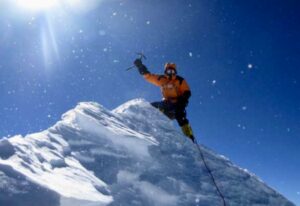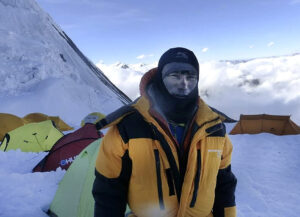Everyone’s worst fears have sadly been confirmed for Russian-American Alex Goldfarb, who went missing on Saturday on Pastori Peak, near Broad Peak and K2. The helicopter searchers have found his body where he presumably fell off the mountain, expedition spokesperson Laszlo Pinter has just reported.
Goldfarb and Hungarian Zoltan Szlanko planned to acclimatize on 6,209 m Pastori Peak before launching a fast, alpine-style ascent of Broad Peak, with no high-altitude porters, supplementary O2, or previously fixed ropes. Pastori had never been climbed in winter before.
Soon after starting the climb, the heavily crevassed terrain proved too hazardous for climbing instructor and mountain rescuer Szlanko, who turned around. Goldfarb chose to continue alone. In his last radio contact with BC, he stated that he planned to summit and then return by Saturday evening. But he failed to show up in BC, and after radio and satphone contact proved useless, a search and rescue operation began.
Helicopters departed Skardu today and picked up John Snorri and Sajid Sadpara, who had quickly volunteered to help, from K2 Base Camp. High winds aborted an initial flight, but on a subsequent pass after the winds had calmed, the pilots spotted rags of a tent. On a third and final flight, they saw Goldfarb’s body. Since his body was visible, he likely fell off the mountain rather than into a crevasse, as had been feared.
In these times where every action first appears on social media, Snorri quietly volunteered for the rescue, and according to journalists close to Szlanko, Snorri has now made room for the surviving climber, Zoltan Szlanko, in his own tent at K2 Base Camp.

Photo: @ralfdujmovits
Goldfarb’s son Levi set up a crowdfunding site to help cover the cost of the helicopter and now has written a moving tribute to his father:
“Alex is a man who never gives up. He moved to America just after the fall of the Soviet regime and began working illegally in a plastic factory and selling his plasma for cash. In just over a decade, he earned two PhDs and became a Professor of Medicine at Harvard.
He went on to have a stunning academic career, publishing over 70 peer-reviewed publications and several books. The most recent was the first Critical Care Medicine book to include a chapter on COVID.
His boundless energy drew everyone close to him, and our house was the place to be on Friday night as guests — invited and spontaneous alike — crowded around the Shabbat table and enjoyed hot food and wine. Alex was always the star of the show: When he wasn’t sharing the latest jokes, he regaled us with tales of epic ascents, like the time he spent the night in a hastily made igloo on his descent from Lenin Peak (7,134 m) or when he saved the life of a man while ice climbing on Khan Tengri (7,010 m). He always made time for interesting hobbies — most recently beekeeping — and kept in touch with friends around the world.
Alex taught me to always strive to be better. He was constantly reading, researching, writing, and adventuring. No achievement was ever enough — he enjoyed the thrill of the chase. He taught me that a person’s true character shows in difficult circumstances.
When the COVID pandemic first broke out, most people, myself included, preferred to stay home and keep safe, Alex sought out the epicenter of the pandemic on the Eastern Seaboard — Elmhurst hospital — and drove there immediately to treat patients in need. He taught me to stand up for what I believe is right and to fight for those who cannot fight for themselves.
If asked what his greatest achievement was, Alex would no doubt mention his family. We knew that he would do anything for us. We never had to worry because he would shoulder any burden for those he loved. He was a great man, and I am proud to be his son. I hope I can one day be a fraction of the man he was.”

